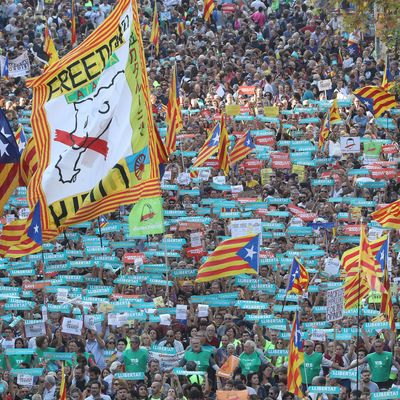
Spain’s political crisis took a turn for the worse on Saturday when Prime Minister Mariano Rajoy announced that he was stripping Catalonia of its leadership and autonomy to prevent the region from seceding. Under the plan, Catalonia’s government, finances, and police will be directly controlled by Spain’s central government, and Carles Puigdemont, the region’s leader, will be removed from power, along with his administration. A new election will then eventually be held to replace him.
The unprecedented development marked the first time Spain has invoked Article 155 of its constitution — its so-called “nuclear option” — to strip the autonomy of one of its 17 regions in order to “restore the rule of law, coexistence and the economic recovery, and to ensure that elections could be held in normal circumstances.” The battle over Catalonia’s independence has rapidly become the worst political crisis in the history of Spain’s four-decade-old democracy.
Prime Minister Rajoy said the country would try to stage new Catalan elections within six months, placing a time limit on Madrid’s emergency powers. The Catalan Parliament will be left intact, but will be prevented from acting against Spain’s constitution. It is far from clear what effects new elections, or new Catalan leadership, might have on the crisis.
“We are not ending Catalan autonomy,” Rajoy insisted on Saturday, “we are relieving of their duties those who have acted outside the law.”
Catalonians may see things differently, and the situation could devolve even further if widespread unrest follows. Already on Saturday, hundreds of thousands of pro-independence protesters took to the streets in Barcelona to reassert themselves following Rajoy’s announcement. Catalan vice-president Oriol Junqueras called Rajoy’s decision “totalitarianism,” and other members of the Catalan government used similarly harsh language in their reactions.
Puigdemont, the Catalan president, has yet to lay out a full response. During a televised address on Saturday, he said he would convene the region’s parliament next week to discuss their next move. It’s possible that he’ll declare full Catalan independence, which he has held off on doing thus far.
The wealthy Catalonia region is united by the Catalan language and a culture that is distinct from the rest of Spain’s. Independence has been a preoccupation among certain sectors of the population for hundreds of years. But that does not mean all Catalonians are united behind the idea of secession. Spain already tried to shut down a referendum on independence held by the Catalan regional government (and dismissed as illegal by the central government) on October 1. Roughly 90 percent of voters supported independence in the referendum, but only an estimated 43 percent of eligible voters braved police crackdowns to participate, and it seems that many of those who opposed independence stayed home. Stripping Catalonia’s autonomy could go a long way in proving the pro-independence crowd’s point, however, and runs the risk of alienating the region’s many moderates.
Most of the rest of Spain appears to be supporting Madrid’s efforts to hold the country together, while much of Europe — which is home to plenty of would-be breakaway regions in other countries — has been nervously watching the crisis unfold. The European Union has tried to stay out of the dispute, which in practice has meant largely shunning the pro-independence movement.






























